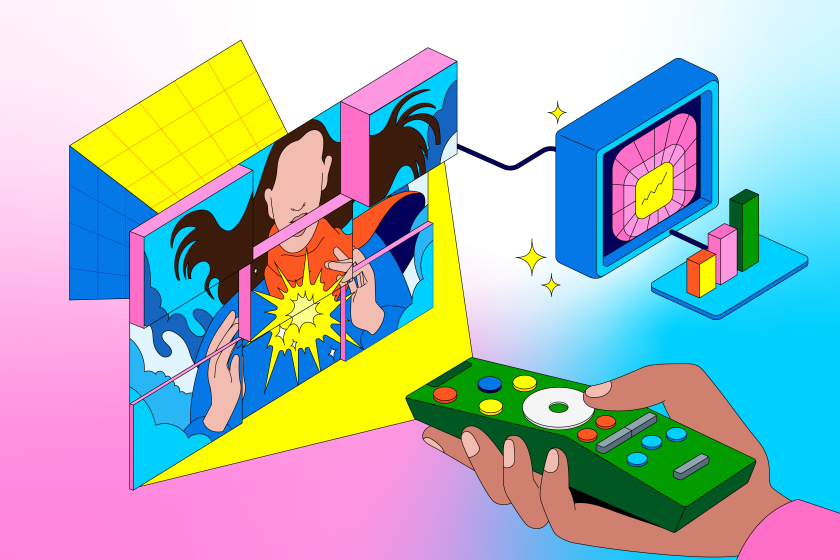Netflix is about to find out whether it can get its own “Game of Thrones” without having “Game of Thrones.”
When Netflix executive Peter Friedlander finished reading the popular Chinese science-fiction trilogy “Remembrance of Earth’s Past” in 2016, he was sure it would be a great TV show. The books, in which Earth is faced with an alien invasion, told an epic, high-stakes story with intricate world-building, time-jumping and powerful themes.
Three years later he found a team of filmmakers who could turn it into a streaming TV phenomenon, if anyone could — David Benioff and D.B. Weiss, the pair who’d adapted George R.R. Martin’s sprawling fantasy saga “A Song of Ice and Fire” into a game-changing hit at HBO. He introduced them to Alexander Woo, co-creator of “The Terror: Infamy,” who joined as a co-showrunner.
It was clearly a risk. The resulting show, called “3 Body Problem,” would be expensive to produce, involve significant visual effects and be shot across England, Spain and the U.S. But Friedlander saw an opportunity to entice Netflix’s global audience to a sci-fi story that included different genres including drama, fantasy elements, mystery and history.
“There’s an opportunity for this show to be wildly popular, and I think it’s because it’s so bold,” Friedlander said. “It’s so innovative. It’s so entertaining and it’s been written and created to bring people onto the ride.”
The eight-episode series, which premieres its full first season Thursday, is part of Netflix’s strategy of betting big on programming that it hopes will resonate with its 260 million global members and prospective subscribers. “3 Body Problem” reportedly cost $20 million an episode to produce for a total budget of $160 million, a big number even for a Netflix sci-fi spectacle, and similar to the per-episode cost of HBO “Thrones” prequel series “House of the Dragon.”
“It’s a big swing. A huge, cinematic bet,” said Bela Bajaria, Netflix’s chief content officer, at a January press event.
Unlike studios such as Walt Disney Co. and Universal Pictures, Netflix does not have a large back catalog of intellectual property it can rely on to keep churning out familiar hits. Instead, the streamer has invested in original stories like “Squid Game” and “Stranger Things” and gamble on producers who are willing to adapt stories from books and history.
Friedlander mentioned Cixin Liu’s books to Benioff and Weiss in 2019. The duo devoured the trilogy on the plane ride back from a “Game of Thrones” event in Japan and realized this was their next project. It had the scale they were interested in, but was also different enough from “Game of Thrones,” with its complex scientific concepts.
“As ‘Thrones’ was coming to a close, David and I knew that we weren’t dead yet,” Weiss said. “Thirteen years in high fantasy was fantastic, but 13 years of mud and horses and armor and more horses stomping through the mud and trying to make sure they didn’t stomp on you — like, we’ve had enough of almost getting stomped on by horses. So we wanted to do something different, science fiction, something we both grew up with.”
Neither Netflix nor the showrunners would comment on the budget, but Benioff has said the series has “four movies’ worth” of visual effects. The show stars actors such as Benedict Wong from Marvel’s “Doctor Strange,” as well as familiar faces from “Game of Thrones” including Liam Cunningham, Jonathan Pryce and John Bradley.
“It looks like a very ambitious show,” said Susanne Daniels, former YouTube global head of original content. “Once in a while all these streamers should swing for the fences and make a little noise to try to stand out as a must-have for the subscribers.”
The high-profile series comes as popular Netflix shows like “The Crown” ended last year and “Stranger Things” and “Cobra Kai” are on their last seasons, leaving Netflix hungry for more expansive, marquee hits.
Other competing streaming services are also spending big on large franchises, even as Wall Street demands financial discipline and increased profits. Amazon spent more than $700 million for the first season of “The Lord of the Rings: The Rings of Power,” including TV rights costs, according to people familiar with the matter who declined to be named. Whether “3 Body Problem” gets a second season depends on whether Netflix viewers tune in. Most reviews have been generally positive.
“I’m nervous because for us, I think we gauge success by being able to tell the whole story and that means not having just one season, it means getting to the end,” Benioff said. “I really desperately want a second season.”
While most known for the success of “Game of Thrones,” not all of the projects that Benioff and Weiss have been linked to have panned out as they looked for their follow-up.
The duo had been tapped to develop a “Star Wars” trilogy for Disney and Lucasfilm that fell through. Also shelved was an HBO show that would have explored a looming third American Civil War, in an alternative reality where the South seceded from the union and slavery still exists (the idea sparked outrage online). The two served as executive producers on a smaller series, Netflix’s “The Chair,” whose showrunner was Benioff’s wife, Amanda Peet. It did not get a second season.
Friedlander had been talking up the “Remembrance of Earth’s Past” books in conversations even before Netflix bought the rights. He called it a “lightning in a bottle moment” where he and “two of the greatest storytellers of all time” responded to Liu’s book. The pair signed an overall deal with Netflix in August 2019.
“Knowing how extraordinary they are at adapting material, I thought, they have to be the best people to do this,” Friedlander said.
He later introduced Benioff and Weiss to Woo, a writer and executive producer on the HBO vampire drama “True Blood.” Netflix secured the rights to the English-language adaptation of Liu’s books in 2020. (A previous Chinese-language adaptation was produced by Shenzhen-based technology and entertainment company Tencent.)
But the project attracted unwanted attention because of global politics. Five U.S. senators in 2020 asked Netflix to reconsider doing business with Liu, who in an interview with the New Yorker appeared to support the Chinese government’s actions in putting Uighur people in indoctrination camps in Xinjiang.
“While Congress seriously considers the systemic crimes carried out against the Uyghurs, we have significant concerns with Netflix’s decision to do business with an individual who is parroting dangerous CCP propaganda,” five Republican senators wrote to Netflix.
Netflix, which is not available in China, said in a response to the senators that Liu’s comments “are not reflective of the views of Netflix or of the show’s creators, nor are they part of the plot or themes of the show.” The showrunners said they met with Liu just once, on Zoom.
Production finished in February 2023. But months later, its showrunners felt something was missing. They wanted to shoot a bar scene in the first episode that they thought was essential for the development of two characters.
Then, the writers’ strike happened before they could write it. That was followed by an actors’ strike, forcing more delays. But Netflix was willing to wait.
“It was a little bit of a tricky thing because it’s like we want you to hold the show that you’ve already spent X number of dollars on, whatever that number might be — a lot of money — for an indefinite period,” Benioff said. “It was a bit of a leap of faith on their part, but they’ve been beside us every step of the way.”
Whether audiences will flock to the show remains to be seen. The series could run the risk of turning off book readers who want a carbon copy of the story as Liu wrote it. Netflix’s English-language adaptation takes place in England, not in China. The Netflix version also features a global cast, changing the race of some of the characters.
“This is a global story,” Woo said. “This is a story of how humanity as a species confronts an existential threat from another planet, and if you’re going to represent humanity as a whole, then you know now the cast should look like humanity as a whole.”
Over the last few months, Netflix has promoted the series through splashy marketing events and initiatives. At the show’s premiere at the South by Southwest festival in Austin, Texas, large holograms were projected into the night sky, with imagery including a giant floating eye.
In a packed theater, 30-year-old animator Daiqi Cui and her husband, photographer Eric Apolly, enjoyed watching the first episode at SXSW. Both live in Brooklyn and are fans of “Game of Thrones.” During the premiere, the couple was given plastic replicas of virtual reality helmets similar to the ones on the show, which they brought back on their flight home and plan to wear.
“They really captured the scenery, exactly how the book would describe it,” said 33-year-old Apolly, who has read Liu’s novels. “The environment was spot on.”
The beginning of the show addresses a dark period in China’s history, which studios that rely on China likely would avoid out of fear of blowback in the country. The series opens with a violent scene set during the Chinese Cultural Revolution in which a physics professor is tortured.
The opening scene in the Netflix version plays out like a documentary, as director Derek Tsang, who worked on the first two episodes, had researched oral histories of that dark historical period, where academics were beaten and some sent to reeducation camps.
“We always go with what’s best for the story,” Benioff said. “There’s full knowledge that this is going to turn some people off and no story is for all people but that’s what this story is.”
Times staff writer Mark Olsen contributed to this report from Austin, Texas.












